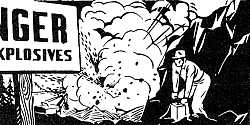|
The invention of gunpowder and the subsequent development of the cannon and musket emphasize the importance of Roger Bacon's work as a bridge between the Dark Ages and the beginning of the new scientific era. He knew his methods of careful experimentation were at odds with the superstition and guesswork of his time because he was often thrown into jail. He realized that his theories and experiments belonged more to the future than to his own time. Yet it is hardly possible that he could have foreseen the great commercial and industrial applications of his ideas, for just as the steam engine and the internal combustion engine were used first in industry and then became important factors in the conduct of war, so gunpowder, developed and first used in war, made an even greater contribution to industry in such places as mines, quarries, clearing of new lands, digging irrigation ditches and in many other applications. In fact, the development of explosives from the work of Roger Bacon has been taken by some to be the beginning of the age of industrial chemistry.  We are fortunate indeed that our peacetime use of explosives has been so great that the production of military needs were met with no unusual difficulty. |








